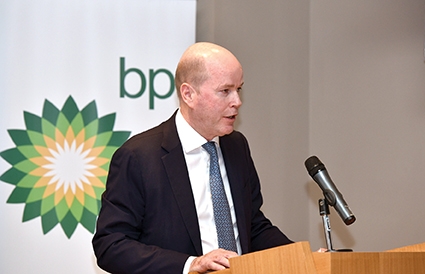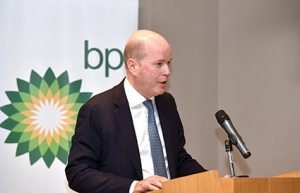Exclusive Interview with BP Regional President
It is just over two decades now that oil giant BP began its operations in Georgia. In that time, a mutually beneficial relationship has blossomed, which has seen the company invest more than 3bn USD in Georgia’s energy infrastructure, introducing international standards of safe and reliable operations, and helping support local communities in business start-ups, agriculture, education and Paralympic sport. Moreover, BP’s three major energy projects that operate in Georgia have significantly changed the energy map of both Georgia and the Caspian region, with the new Southern Gas Corridor expected to bring profound changes to the energy map of Europe.
Both in the operation since 2006, the Baku-Tbilisi-Ceyhan oil pipeline (BTC) and South Caucasus gas pipeline (SCP), run by BP on the behalf of two international consortia of energy companies and investors, run side by side for 248 kilometers within Georgia. A gas off take pressure reduction and metering facilities on the SCP, along with two BTC pump stations can also be found within Georgian territory.
Finally, there is also the Western Route Export Pipeline (WREP) and Supsa terminal, which BP operate on the behalf of an international consortium of energy companies, that transports oil from the Caspian Sea oil fields via Azerbaijan’s Sangachal terminal to Georgia’s Supsa terminal on the Black Sea.
Gary Jones is BP’s Regional President for Azerbaijan, Georgia and Turkey, accountable for all of BP’s upstream activities in the region. Starting his career with BP in 1981, Gary has held many leadership positions in drilling, operations and projects. Key leadership positions have included, heading BP’s operations in Iraq as General Manager Rumaila / Vice President Operations, serving as a key leader in Russia as the Project Director/Performance Unit Leader, Verkhnechonskoye, and holding multiple senior leadership positions across BP’s North Sea asset base. Ahead of the Tbilisi Belt & Road Forum, GEORGIA TODAY sat down with Gary for an exclusive interview on the significance of BP’s presence in Georgia, and what plans are in place to continue their over two decade-long partnership.
In your program notes you mention that “Georgia plays a significant role in the energy security and supply diversity of the region.” Could you please elaborate?
With the contract of the century in 1994, we started the development of Azeri-Chirag-Gunashli (ACG) field, the big oil development in the Caspian, a massive field on a global scale. Essentially, that was the start of the Western Route Export Pipeline better known as Baku-Supsa pipeline. After the completion of this early oil project, we have constructed two major pipelines Baku-Tbilisi-Ceyhan oil (BTC) and South Caucasus gas pipelines from the Caspian through Azerbaijan, Georgia and to Turkey and operated them successfully since 2005. The gas story in the region started with Shah Deniz Stage 1 production in 2006 and since then has been reliably supplying gas to the regional markets including Georgia. That was also the start of Georgia becoming such an important transit route for the Caspian into the international markets. That now expands with the development of the Southern Gas Corridor.
The Southern Gas Corridor including Shah Deniz Stage 2, South Caucasus Pipeline Expansion, Trans Anatolian Natural Gas Pipeline (TANAP) and Trans Adriatic Pipeline (TAP) forms one of the largest energy projects anywhere in the world. This pipeline system enables us to take gas from the Caspian all the way to Southern Italy. So, from a gas perspective, the Caspian now has an export route not only to Turkey but to Southern Italy as well — Georgia is right at the heart of it all. Without Georgia, the resources of the Caspian would not be as available as they are today.
Currently, in Azerbaijan and Georgia, the project is over 97% complete and on target to deliver first gas to Turkey next year. At the peak of the construction activities this project employed 24,000 people in Azerbaijan, 6000 in Georgia and perhaps twice as many in other countries along the Southern Corridor.
We are making good progress in Georgia. Compressor Station 1 (in Gardabani) was mechanically completed in August and we are preparing for the introduction of hydrocarbons as we speak, while the Georgia pipeline loop and the pressure reduction and metering station at the Georgia-Turkey border (Area 81) will be handed over to Operations before the end of the year. The Georgia pipeline (66km in Georgia) construction is completed. Compressor Station Georgia 2 (CSG2) construction is close to completion. We are firmly on track to deliver our commitments for 1st gas in 2018.
Could you please explain how the new Southern Gas Corridor will change the energy map of Europe?
The Southern Gas Corridor provides an export route for Caspian gas into Italy and therefore into Southern Europe, a possibility that was previously unavailable. Before, all the gas from the Caspian went to either Georgia, Azerbaijan, or Turkey, with about 10 billion cubic meters (bcm) per year being supplied to these countries via the existing infrastructure. The new Southern Gas Corridor will see another 16bcm produced, of which about 10bcm will go into Southern Europe for the first time. Furthermore, any new discoveries that may happen in the Caspian will now automatically have a transit route and, if needed, we can expand existing capacity further by adding more compressor stations. What this means now is that gas discoveries in the Caspian will be advantaged as a result of the investment into the infrastructure.
Relative to the energy needs of Europe, how effective is the expansion of this Southern Gas corridor to providing the continent with an alternative to Russian gas?
It is all relative. Right now, these changes will see 10bcm headed into Europe, but the pipeline has the capacity to double that to 20bcm. While it is relatively small compared to the big picture, the point is that it creates that opportunity for diversity which is so important.
On the subject of “competition,” with the Black Sea Region being a hotspot of geopolitical conflicts and rivalry in many fields including energy security, to Europe especially, how vulnerable are BP’s plans and infrastructure to any new geopolitical conflicts?
BP has been around for over a hundred years; geopolitics is not new. We’ve been in Russia for a long time, as well as in Iraq for quite a long while, too. Indeed, part of my career I spent in Iraq, on the Rumaila field which BP first discovered back in 1950. So, in our industry, the time of discovery to production can be five to ten years, so we always play the long game. Politics tends to vary but the bottom line is that the world needs energy, it needs heat and light. Many parts of the world still do not have reliable heat and light so there’s definitely a demand for it. Our job, with our co-venturers, is to always look for opportunities to expand and create more diversity of source to keep that supply sustained.
With regards to new fields you are discovering, and the new supply line that will be transporting both oil and gas to Georgia and Europe, is there a timeframe for how long these reserves will last?
We recently extended the production share agreement on the ACG oil field until 2050, signed on September 14. In addition, we have already extended the Shah Deniz gas field, to a similar 2050 timeframe. Essentially, the Caspian is a potentially huge source of hydrocarbons, and what we are developing now at ACG and Shah Deniz Phase 1 & 2 represents about 10 billion barrels of oil and gas equivalent. There is another 10 billion barrels of oil and gas equivalent in the Caspian that has already been discovered, though it has yet to be developed. Then there is another 10-12 billion barrels there to be explored. We have some exploration programs, as do other companies, for looking at developing those reserves and to see if they are commercially attractive. So, there’s huge potential.
If you look at other big basins around the world, the North Sea, the Gulf of Mexico, Alaska, etc., and where the Caspian is now, then the future of the Caspian could be very exciting because of all the big reserves, and the satellite projects that build on the existing infrastructure. As long as we can get the cost structure right, and the governments of Azerbaijan, Georgia, Turkey, and Italy, are willing to cooperate in the process of developing their resources, there’s a lot more success to be had on top of what we have already achieved.
In terms of continuing and building on your projects in Georgia, what kind of future involvement in the country can we expect from BP, not only in the energy sector but in your work at the community level?
Just through BTC and the South Caucasus Pipeline, we’ve invested about $2 billion, and the extension of the South Caucasus Pipeline takes the spending to about $4 billion in business expenditure, and of course on top of that investment there is the proceeds the government gets for the opportunity to transport the oil and gas. With our co-venturers and our partners, we’ve also spent about a $100 million on social investment programs, which you would expect as you get involved in these sorts of strategic developments over many, many years. Social investment is a part of that, and in Georgia, together with our oil and gas partners and local donors and business partners, we support local communities and wider society with access to energy and energy efficiency, business start-ups and agriculture, education and Paralympic sports.
Our community development program is focused on the communities living along the pipeline route, where we look at all the villages and say, “how can we make sure that the local people benefit?”, and that could anything from education, business start-ups to farming. All the work, in whichever sphere it is, is always done in the spirit of ‘how can we really educate people to become independent and self-sufficient?’ So it’s not just about giving them things but making sure they are sustainable, and actually that is some of the most fulfilling work we do.
Mate Foldi











